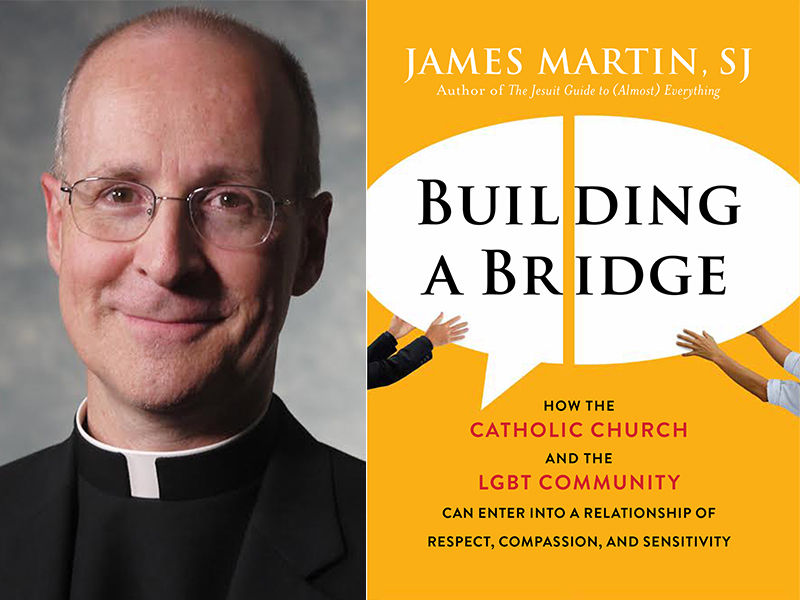Rob Lee: 'Building a Bridge': An interview with Father James Martin
He might be the most famous Catholic priest in the country. Father James Martin, SJ has sat down with me before and I consider him to be a light in this world. But this past year he, like me, has faced controversy. He wrote a book titled: "Building a Bridge: How the Catholic Church can Enter into a Relationship of Respect, Compassion, and Sensitivity." I sat down with Father Martin and interviewed him about his new book and his hopes for our world.

_ Father James Martin and his recent book, "Building a Bridge." _
He might be the most famous Catholic priest in the country. Father James Martin, SJ has sat down with me before and I consider him to be a light in this world. But this past year he, like me, has faced controversy. He wrote a book titled: "Building a Bridge: How the Catholic Church can Enter into a Relationship of Respect, Compassion, and Sensitivity." I sat down with Father Martin and interviewed him about his new book and his hopes for our world.
RL: You've made headlines lately for what some Christians characterize as holy reasons, and what others characterize as heretical reasons. Why are Christians so divided?
JAMES MARTIN: On the issue of welcoming LGBT people? There's probably a combination of reasons for the opposition to what I'm proposing in my book. First and foremost, homophobia, the fear of the LGBT person as the "other." That is, actual fear. Then there is homophobia in the more colloquial sense: hatred of LGBT people. Finally, there is the fear of one's own complicated sexuality, which manifests itself in rage. But what I'm calling for in my book is pretty mild: "respect, compassion and sensitivity" for LGBT people in our churches. It's pretty surprising that even that is too much for some Christians. If respect is heretical, then we've misread the Gospels.
RL: What would Jesus say about what you call the "consistent ethic of life"? That is to say how do we engage the Gospel from conception to grave?
JM: Jesus himself practiced a "consistent ethic of life" in his public ministry. He treated all human life as sacred. Think of all the people whose lives were considered somehow "less than," especially the sick, in Jesus's time. Our Lord treated them with the greatest of respect and care. For me the "consistent ethic of life" or the "seamless garment approach," reminds us that all life -- from natural conception to natural death -- is to be reverenced. All life is a sacred and precious gift from God. That includes the life of the unborn, but also the life of the refugee, the migrant, the unwed mother, the person with a terminal illness, as well as the life of the ill-clothed homeless person, the struggling single parent, and the bullied LGBT teen. All life is sacred.
RL: Steve Bannon recently cited undocumented immigrants and the church's need to fill pews. With that in mind, what is the church's mission to people within our borders who are undocumented?
JM: It is Jesus's mission, as elaborated in Matthew 25: to welcome the stranger. There are many things in the Gospels that may be difficult to interpret, or at least open to interpretation, but this passage couldn't be any clearer. When you welcome the stranger, you welcome Jesus himself. And, by the way, if you also add the Parable of the Good Samaritan, we're reminded that Jesus doesn't say welcome the stranger only when it's easy, or only when it's convenient, or only when he's from the same ethnic group, or only when there's no danger involved, he says, "Welcome them." Remember, in the case of the Good Samaritan, the Samaritan incurs significant risk when he helps the man. After all, the man has been beaten and robbed along a dangerous stretch of road. So we are called to welcome the stranger. Period.
RL: Your newest book speaks of building a bridge between the Church and the LGBTQ community. What has been your takeaway from this journey of writing and the backlash you've received since its release?
JM: My takeaway is that the passionate reactions on both sides show that the book needed to be written. The overwhelming response has been positive: When I give talks at parishes or retreat houses or conferences, people come up to hug me or cry when they say how much they appreciate the book. And I've been overwhelmed by the letters, cards, emails and conversations with people expressing support and encouragement. My sense is that even though the book is mild, and doesn't challenge any church teaching, LGBT people and their families are grateful for the call for welcome and inclusion, particularly coming from a priest, On the other side, some of the frankly hysterical responses from hateful far-right online sites and magazines show how much homophobia there still is in the church. So both responses indicate that the book needed to be written.
RL: If you have one piece of advice to church communities in a small town like Statesville, what might that be?
JM: Welcome people who seem different from you. Just consider the Gospels. When Jesus reaches out to people who feel like they are on the margins, he leads first with welcome, not condemnation. He doesn't shout, "Sinner" or "Pagan!" Rather, he welcomes first. So "Love one another" in many cases means "Welcome one another."
Rev. Rob Lee is an author, pastor and Statesville native. Email him at rob@revroblee.com or find him on Twitter @roblee4.
